Pope proclaims Sri Lanka’s first saint, right to religious freedom

Interreligious meeting in Sri Lanka.
Canonizing Sri Lanka’s first saint, who ministered to Catholics under persecution three centuries earlier, Pope Francis proclaimed what he called the “fundamental human right” of religious freedom.
“Each individual must be free, alone or in association with others, to seek the truth, and to openly express his or her religious convictions, free from intimidation and external compulsion,” the Pope said January 14, before a congregation of more than 500,000 in a beachfront park on the Indian Ocean.
Pope Francis gave his homily half an hour after canonizing St. Joseph Vaz, a 17th- and 18th-century missionary from India who rebuilt the Catholic Church in Sri Lanka after its suppression by Dutch Protestant colonists.
The Pope called on Catholics today to emulate the new saint by spreading the Gospel with “missionary zeal.”
“St. Joseph knew how to offer the truth and the beauty of the Gospel in a multireligious context, with respect, dedication, perseverance and humility,” the Pope said. “We are called to go forth with the same zeal, the same courage of St. Joseph, but also with his sensitivity, his reverence for others, his desire to share with them that word of grace which has the power to build them up. We are called to be missionary disciples.”
Noting that St. Joseph had won the support of a Buddhist king by caring for victims of a smallpox epidemic, and thus “was allowed greater freedom to minister,” the Pope praised today’s Sri Lankan Catholics, who make up only 7 percent of the population, for their charitable service to their neighbors.
The Church in Sri Lanka today “makes no distinction of race, creed, tribe, status or religion in the service she provides through her schools, hospitals, clinics and many other charitable works. All she asks is the freedom to carry out this mission,” he said. “As the life of St. Joseph Vaz teaches us, genuine worship of God bears fruit not in discrimination, hatred and violence, but in respect for the sacredness of life, respect for the dignity and freedom of others, and loving commitment to the welfare of all.”
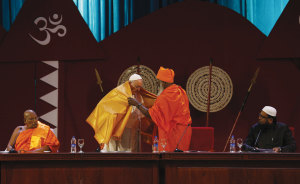
Pope Francis receives a robe from Hindu Kurukkal Siva Sri T. Mahadeva during a meeting with religious leaders.
The canonization Mass reflected the multicultural character of Sri Lankan society. The Pope celebrated the liturgy in English and Latin, but there were readings in the local languages of Tamil and Sinhalese. Drums and sitars accompanied the choir, and dancers in traditional costume performed before the start of Mass. The altar was housed in a structure whose peaked roof recalled the Buddhist temple architecture of Kandy, the central region of the country where St. Joseph won acceptance for his ministry.
Temperatures and humidity levels were both in the high 70s and attendants held umbrellas over priests as they distributed Communion. At the end of Mass, Cardinal Albert Malcolm Ranjith of Colombo addressed the Pope, thanking him for the new saint, “God’s precious gem for Sri Lanka.”
Cardinal Ranjith also asked for Pope Francis’ blessing and guidance in the search for reconciliation after Sri Lanka’s two-and-a-half decade civil war between government forces and rebels from the Tamil-Hindu minority, which ended in 2009.
“We call upon you to kindly help us in that search for a true healing of hearts, the strength to ask pardon from each other for the senseless violence unleashed then, to forgive and forget that sad past and to arrive at a process of give and take to build bridges of understanding between the parties hurt in the conflict. We are still far from reaching that goal,” the cardinal said. “Our nation… does possess the moral and spiritual strength and nobility needed to generate such peace.”
—Francis X. Rocca (CNS)
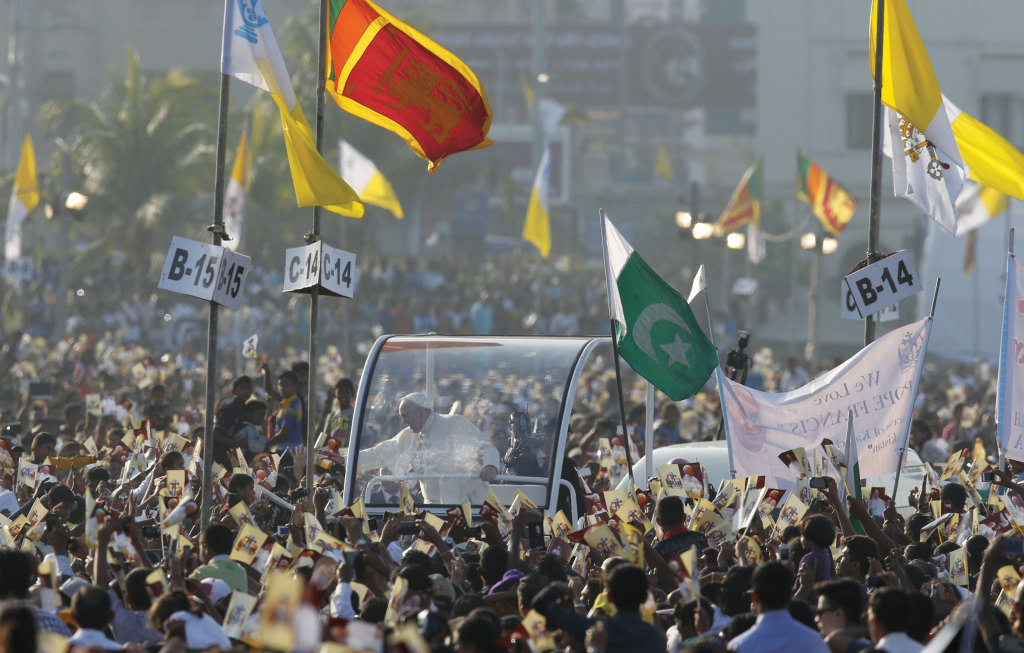
Pope Francis arrives in the popemobile before he celebrates the canonization Mass of St. Jopseh Vaz at Galle Face Green.
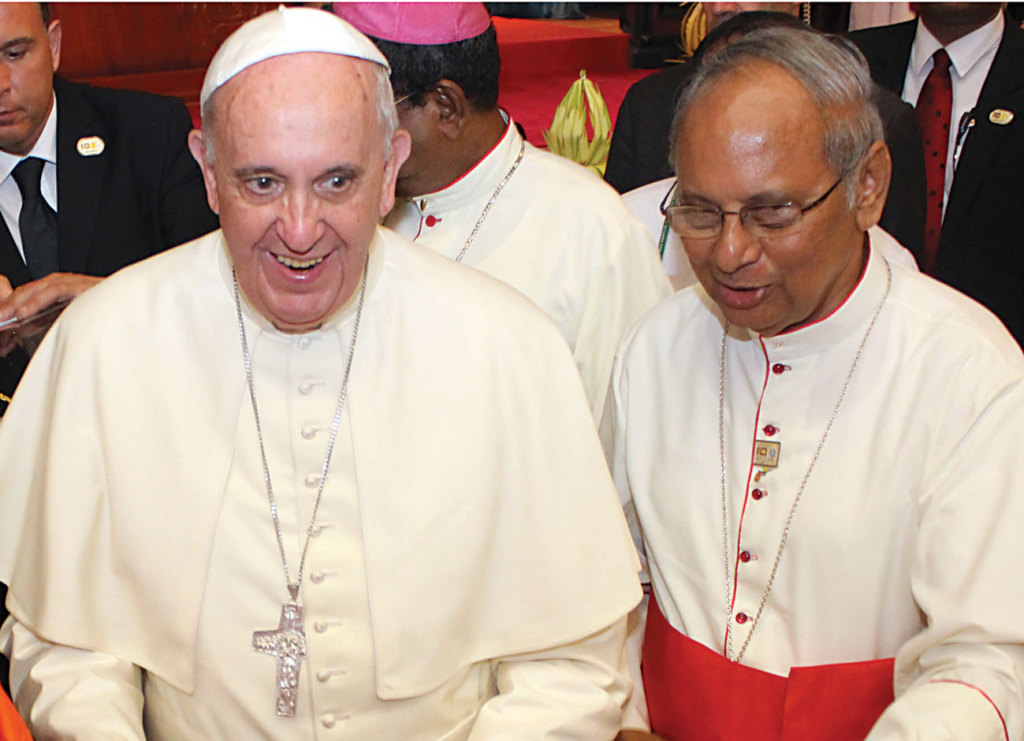
Pope Francis and Cardinal Albert Malcolm Ranjith, Archbishop of Colombo.
Philippines / At Mass With Millions, Pope Says “Protect The Family”
Pope Francis told a crowd of an estimated 6 million gathered in a Manila park to protect the family “against insidious attacks and programs contrary to all that we hold true and sacred, all that is most beautiful and noble in our culture.”
The Pope’s homily at the Jan. 18 Mass also reprised several other themes he had sounded during the four-day visit, including environmental problems, poverty and corruption.
Despite continuous rain, the congregation in Rizal Park began to assemble the night before the afternoon celebration. Cardinal Luis Antonio Tagle of Manila canceled other Masses throughout the archdiocese to enhance turnout. The crowd was so dense in spots that people passed hosts to fellow worshippers unable to reach priests distributing Communion.
The government estimated total crowd size at 6 million-7 million people. According to the Vatican spokesman, Jesuit Father Federico Lombardi, that would be the largest number of people ever to gather to see a Pope. A Mass with St. John Paul II in the same place 20 years earlier is believed to have drawn 4 million-5 million people, often described as the largest live crowd in history.
The Mass was celebrated on Santo Nino Day, or the feast of the Holy Child Jesus, one of the most popular feast days in the Philippines. Many of those who walked great distances down closed roads to get to Rizal Park held statues of Santo Nino.

Pope Francis kisses a baby as he arrives to celebrate mass.
For his final scheduled public talk in the country, Pope Francis stuck to his prepared English text and did not improvise in Spanish, as he had done at several emotional points during the visit. Yet his voice rose with emphasis during the passage about protecting the family.
Those words echoed his warning, during a Jan. 16 meeting with Filipino families, against “ideological colonization that tries to destroy the family” through such practices as same-sex marriage and contraception.
In his homily, Pope Francis said Christians “need to see each child as a gift to be welcomed, cherished and protected. And we need to care for our young people, not allowing them to be robbed of hope and condemned to life on the streets.”
The Pope praised the Philippines, whose population is more than 80 percent Catholic, as the “foremost Catholic country in Asia,” and said its people, millions of whom work abroad, are “called to be outstanding missionaries of the faith in Asia.”
Yet he warned the developing nation, one of Asia’s fastest-growing economies, against temptations of materialism, saying the devil “hides his snares behind the appearance of sophistication, the allure of being modern, like everyone else. He distracts us with the promise of ephemeral pleasures, superficial pastimes. And so we squander our God-given gifts by tinkering with gadgets; we squander our money on gambling and drink.”
Pope Francis, who had urged a group of young people earlier in the day to address the challenge of climate change through dedication to the environment, told Mass-goers human sinfulness had “disfigured (the) natural beauty” of creation. Other consequences of sin, the Pope said, were “social structures which perpetuate poverty, ignorance and corruption,” problems he had emphasized in his Jan. 16 speech at Manila’s presidential palace.
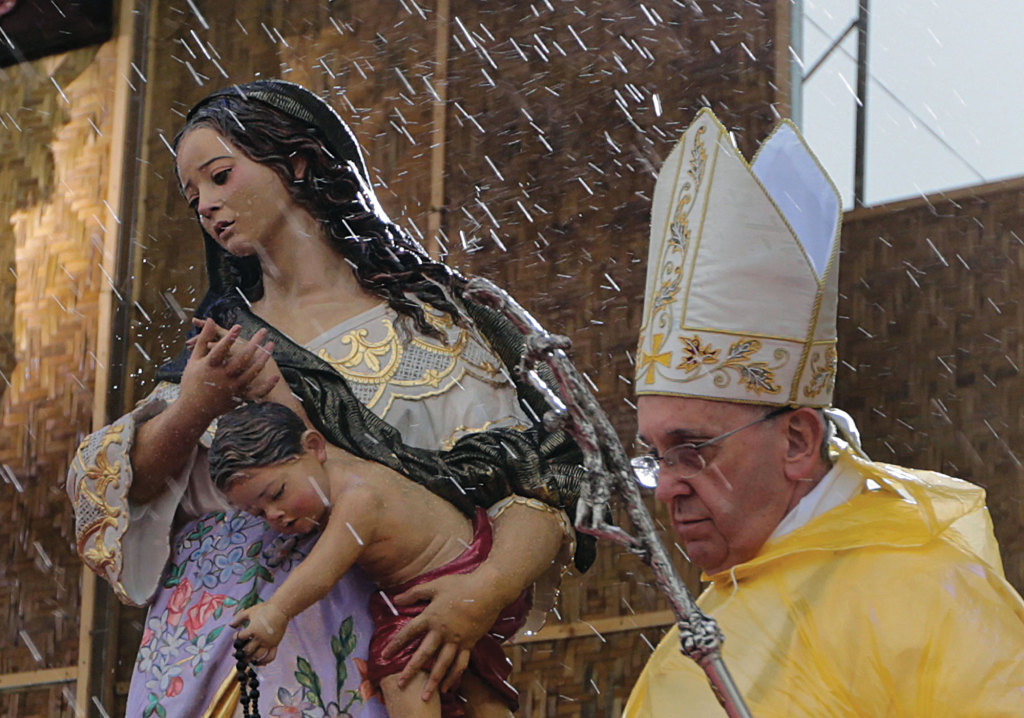
Rain falls as Pope Francis walks past a statue of Mary and the Christ child as he celebrates Mass adjacent to the airport in Tacloban, Philippines.
Philippine trip highlights Pope’s tenacity, attention to detail
New situations are opportunities to learn new things, even about the 78-year-old Pope Francis. After two days of watching the Pope tenaciously keep his appointments in the Philippines despite pouring rain January 17-18, one lesson is that the papal wardrobe needs to be expanded to include rain gear.
A white umbrella — the usual Vatican response to a drizzle — is not adequate. And canceling or moving an event indoors — the usual Vatican response to a heavy rain — is not acceptable to Pope Francis if his appointment is with thousands or even millions of predominantly poor people.
Then again, the clear yellow plastic poncho he donned over his chasuble for Mass January 17 in Tacloban and again January 18 for his ride in a converted jeepney popemobile in Manila made him “one of the people,” which they liked. On social media, he was dubbed “ponchifex,” a play on the formal Twitter title, “pontifex.”
Pope Francis, the grandson of Italian immigrants, takes a typically Italian approach to weather: it requires protection. On sunny days in St. Peter’s Square, he urges — sometimes with an almost scolding look — parents to put hats on their children. On cold days, he wears a long white overcoat and asks parents of the underdressed where their children’s coats are. When a guard passes a baby to him on a cold day, he often adjusts the child’s coat or scarf to ensure proper bundling.
Much more importantly, Bishop Mylo Vergara of Pasig, head of the media committee for Pope Francis’ visit, said the wet and stormy weather, which included the approach of a category-two tropical storm in Tacloban, taught people how seriously Pope Francis takes his promises to the poor and suffering. Because the pilots flying him to Tacloban, the area devastated by Typhoon Haiyan in 2013, insisted he leave the area before 1 p.m., instead of the originally scheduled 5 p.m., he left Manila an hour early to get there, “he abbreviated everything, but he did all the events,” the bishop said.
The rain did not dampen the spirits of the people, and the Pope did not let them down.
Some 30,000 exuberant youths congregated in the rain January 18 at the University of Santo Tomas. The Pope gathered them and drew them into prayers for the 27-year-old Catholic Relief Services worker, Kristel Padasas, who died the day before after an accident at the Tacloban Mass site.
Two other elements at the youth gathering did not escape the Pope’s eye for detail: first, the fact that of the four youths chosen to address him, only one was female — a situation he said should be rectified the next time a Pope visits.
And, second: tears. People get emotional when a Pope is around. Many are overcome with tears after even the most fleeting moment with the Pope. But the tears shed by 12-year-old Glyzelle Palomar were different. The Pope honored the tears of the girl rescued from the streets and then helped the 30,000 youths present reflect on the role of tears in response to her suffering and the suffering of so many innocents. “Certain realities in life can only be seen through eyes cleansed by tears,” the Pope told them. And the only worthy response to questions about why God allows suffering is tears of compassion, he said.
—By Cindy Wooden
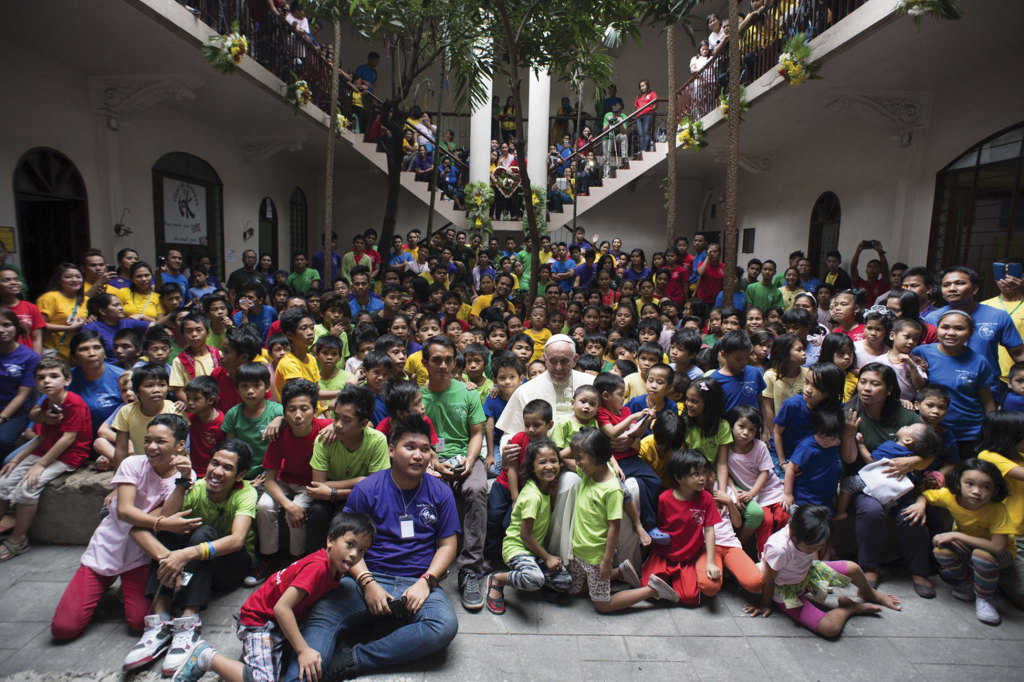
Pope Francis is pictured with youths at a home for former street children in Manila, Philippines.
Pope says same-sex marriage threatens family
Appealing to the traditional values of Filipino Catholic families, Pope Francis on January 16 made one of his strongest calls as Pope against movements to recognize same-sex unions as marriage.
“The family is also threatened by growing efforts on the part of some to redefine the very institution of marriage,” the Pope said at a meeting with families in the city’s Mall of Asia Arena, hours after warning at a Mass in Manila’s cathedral that Philippine society was “tempted by confusing presentations of sexuality, marriage and the family.”
“As you know, these realities are increasingly under attack from powerful forces which threaten to disfigure God’s plan for creation and betray the very values which have inspired and shaped all that is best in your culture,” he said.
At the family meeting, the Pope called on his listeners to resist “ideological colonization that threatens the family.”
The Vatican spokesman, Jesuit Father Federico Lombardi, said later that the Pope was referring to same-sex marriage, among other practices. Cardinal Luis Antonio Tagle of Manila, who was present at the reporters’ briefing, cited claims by African bishops that foreign aid to their countries is sometimes offered on the condition that they accept “alien” views of sexuality and marriage.
Civil law in the Philippines does not recognize marriages or unions between people of the same sex.
The Pope’s comments came less than a week after a speech to Vatican diplomats in which he criticized “legislation which benefits various forms of cohabitation rather than adequately supporting the family for the welfare of society as a whole,” saying that such legislation had contributed to a widespread sense of the family as “disposable.”
In November, Pope Francis told an interreligious conference on traditional marriage that preserving the family as an institution based on marriage between a man and a woman is not a political cause but a matter of “human ecology,” since “children have the right to grow up in a family with a father and mother capable of creating a suitable environment for the child’s development and emotional maturity.”
As archbishop of Buenos Aires, then-Cardinal Jorge Maria Bergoglio opposed same-sex marriage in Argentina, calling it an “anti-value and an anthropological regression” and “destructive of the plan of God,” and writing that it expressed the “envy of the devil.” But he did not repeat such statements following his election as Pope. When asked why he had not spoken about Brazil’s legalization of abortion and same-sex marriage during his July 2013 trip to the country, the Pope said, “The Church has already spoken quite clearly on this. It was unnecessary to return to it.”
In an interview published in September 2013, Pope Francis told Jesuit Father Antonio Spadaro: “We cannot insist only on issues related to abortion, gay marriage and the use of contraceptive methods. This is not possible. I have not spoken much about these things, and I was reprimanded for that… The teaching of the Church, for that matter, is clear and I am a son of the Church, but it is not necessary to talk about these issues all the time.”
The Pope’s latest statements come during a year of preparation for the October 2015 world Synod of Bishops on the family. At the 2014 gathering, a midterm report stirred controversy with conciliatory language toward people with ways of life contrary to Catholic teaching, including those in same-sex unions. While such unions present “moral problems,” the document stated, they can exemplify “mutual aid to the point of sacrifice (that) constitutes a precious support in the life of the partners.” That language was absent from the final report, which quoted a 2003 Congregation for the Doctrine of the Faith text: “There are absolutely no grounds for considering homosexual unions to be in any way similar or even remotely analogous to God’s plan for marriage and family.”
In a December interview with Argentine journalist Elisabetta Pique, Francis described the midterm report as “merely a first draft,” and said it had mentioned “positive factors” of same-sex unions in an effort to help families support their gay members. “Nobody mentioned homosexual marriage at the Synod; it did not cross our minds,” the Pope said.
—Francis X. Rocca (CNS)
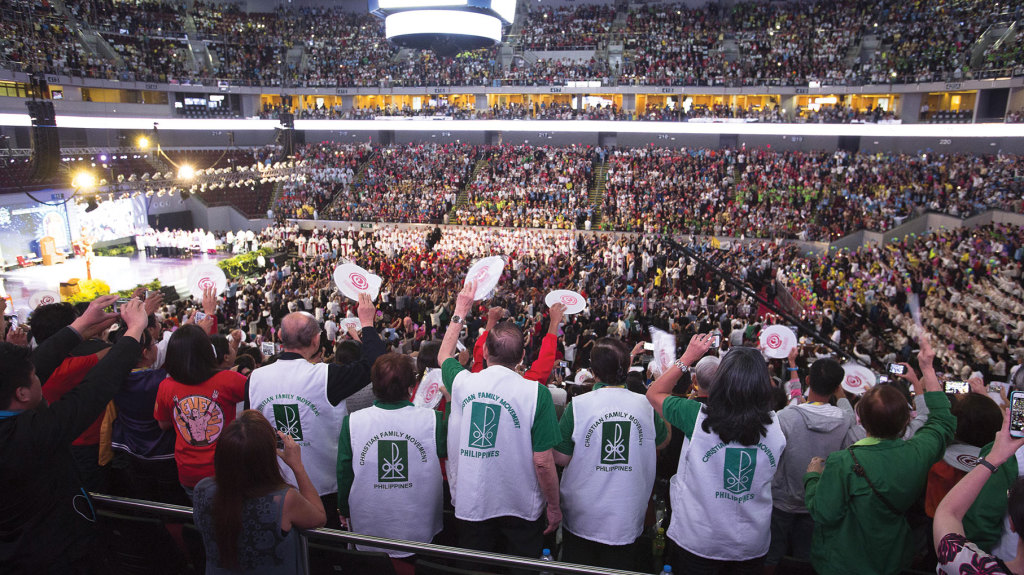
Pope Francis during a meeting with families in the Mall of Asia Arena in Pasay City, Philippines.
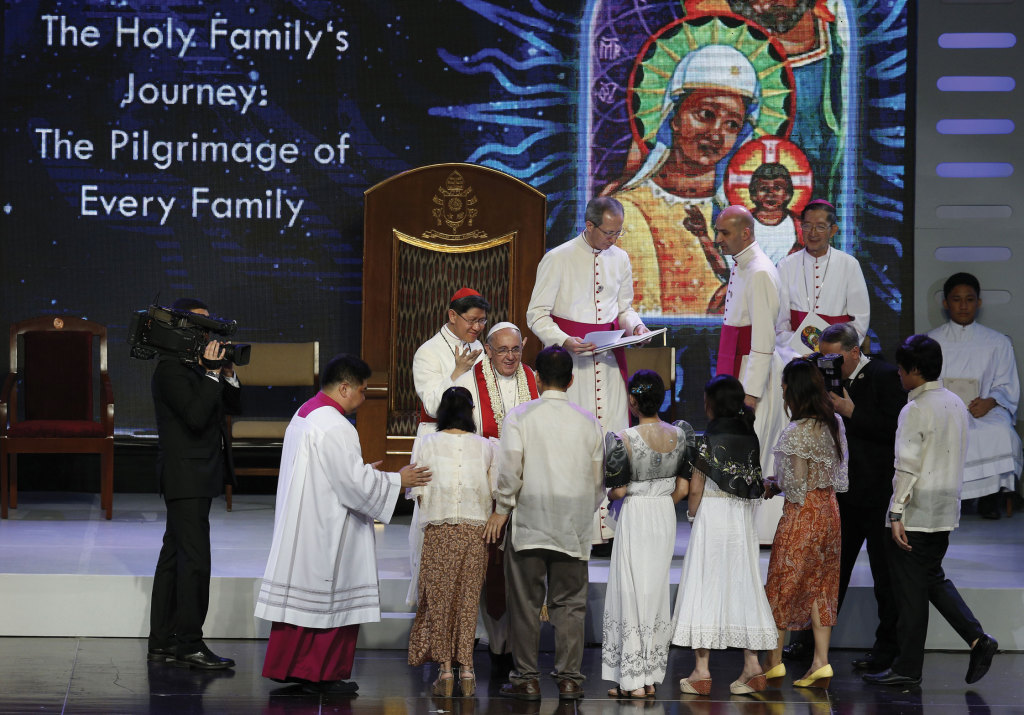
Pope Francis at Asia Arena.
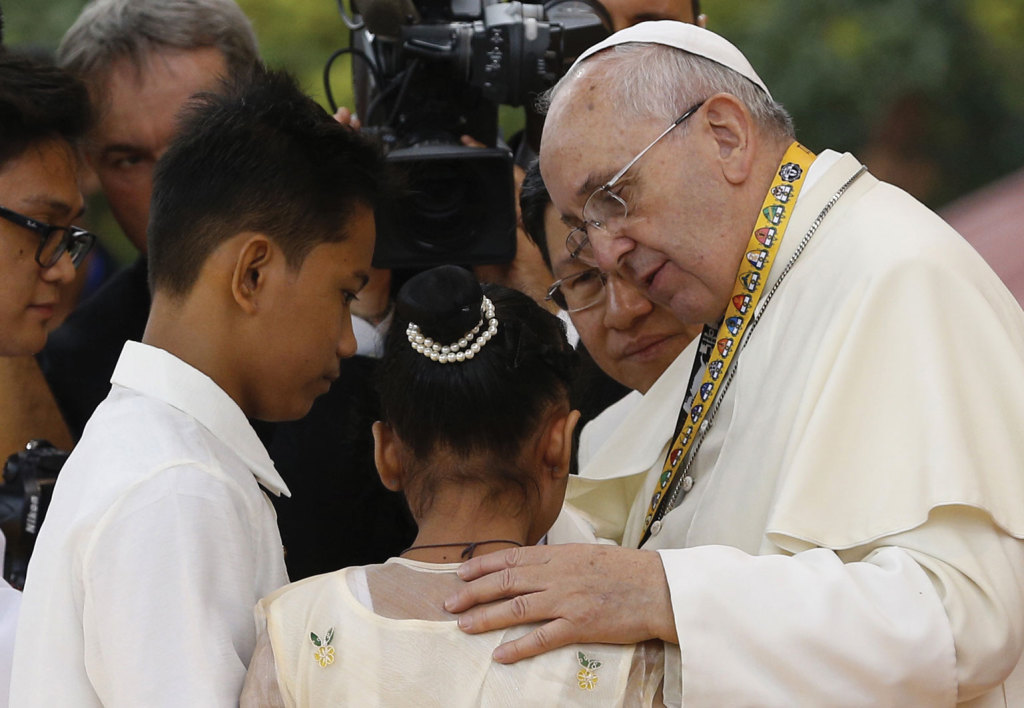
Pope Francis greets Jun Chura, 14, and Glyzelle Palomar, 12, two former street children who spoke during a meeting with young people at the University of St. Thomas in Manila, Philippines.

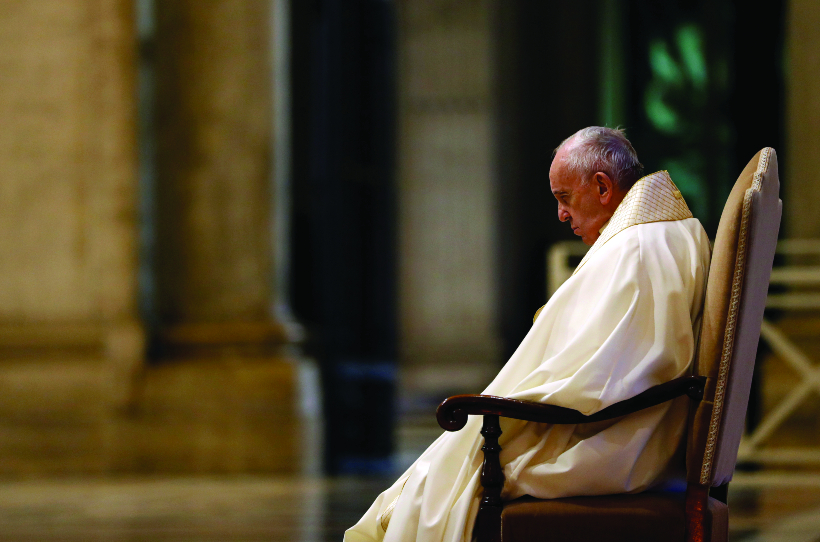
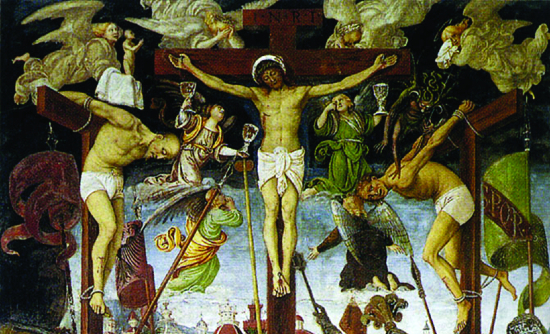
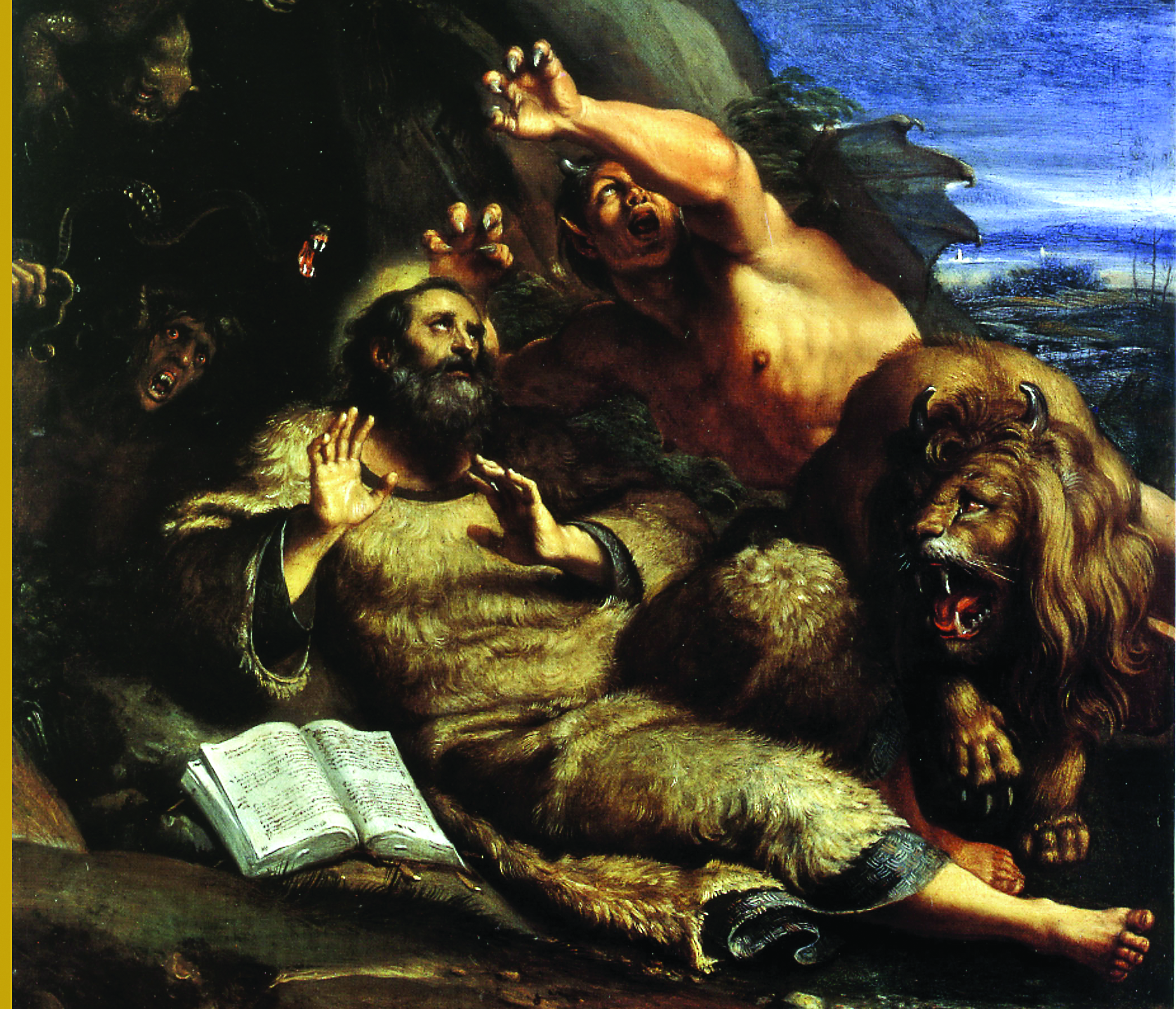
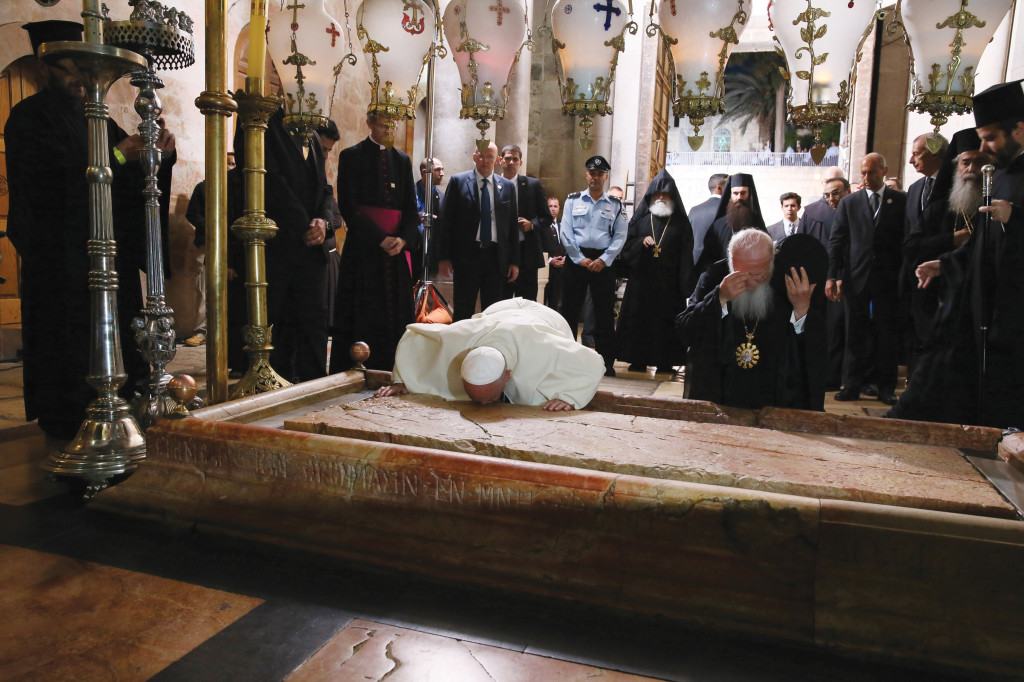
Facebook Comments